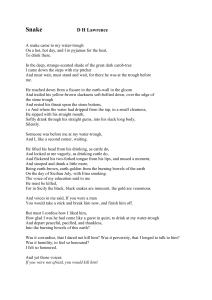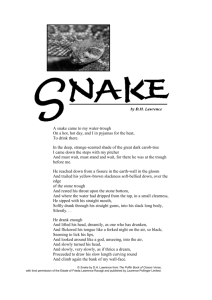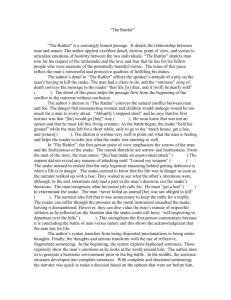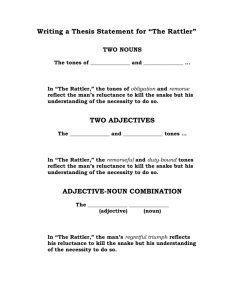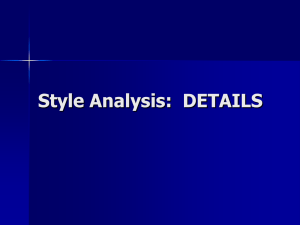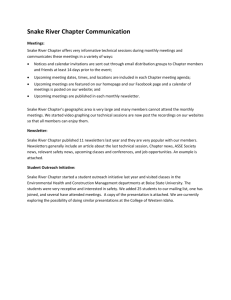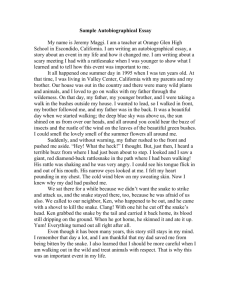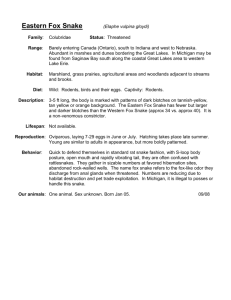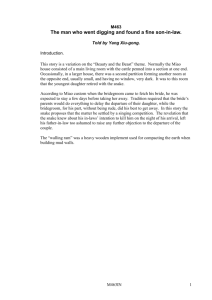AP Language and Composition
advertisement
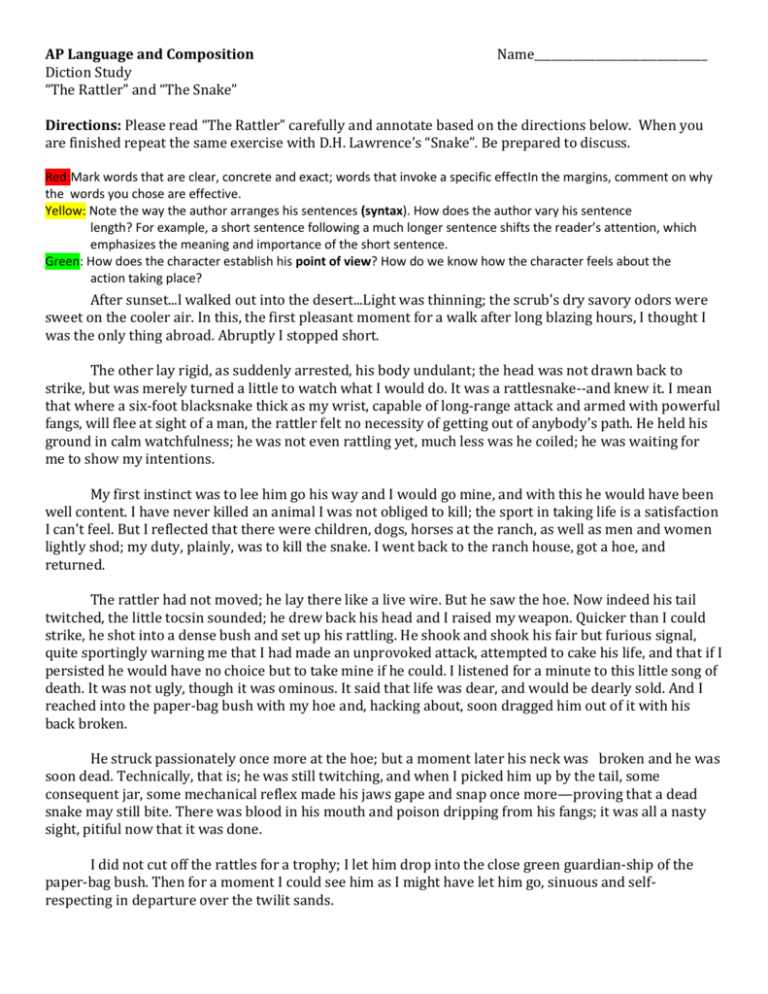
AP Language and Composition Diction Study “The Rattler” and “The Snake” Name_______________________________ Directions: Please read “The Rattler” carefully and annotate based on the directions below. When you are finished repeat the same exercise with D.H. Lawrence’s “Snake”. Be prepared to discuss. Red:Mark words that are clear, concrete and exact; words that invoke a specific effectIn the margins, comment on why the words you chose are effective. Yellow: Note the way the author arranges his sentences (syntax). How does the author vary his sentence length? For example, a short sentence following a much longer sentence shifts the reader’s attention, which emphasizes the meaning and importance of the short sentence. Green: How does the character establish his point of view? How do we know how the character feels about the action taking place? After sunset...l walked out into the desert...Light was thinning; the scrub's dry savory odors were sweet on the cooler air. In this, the first pleasant moment for a walk after long blazing hours, I thought I was the only thing abroad. Abruptly I stopped short. The other lay rigid, as suddenly arrested, his body undulant; the head was not drawn back to strike, but was merely turned a little to watch what I would do. It was a rattlesnake--and knew it. I mean that where a six-foot blacksnake thick as my wrist, capable of long-range attack and armed with powerful fangs, will flee at sight of a man, the rattler felt no necessity of getting out of anybody's path. He held his ground in calm watchfulness; he was not even rattling yet, much less was he coiled; he was waiting for me to show my intentions. My first instinct was to lee him go his way and I would go mine, and with this he would have been well content. I have never killed an animal I was not obliged to kill; the sport in taking life is a satisfaction I can't feel. But I reflected that there were children, dogs, horses at the ranch, as well as men and women lightly shod; my duty, plainly, was to kill the snake. I went back to the ranch house, got a hoe, and returned. The rattler had not moved; he lay there like a live wire. But he saw the hoe. Now indeed his tail twitched, the little tocsin sounded; he drew back his head and I raised my weapon. Quicker than I could strike, he shot into a dense bush and set up his rattling. He shook and shook his fair but furious signal, quite sportingly warning me that I had made an unprovoked attack, attempted to cake his life, and that if I persisted he would have no choice but to take mine if he could. I listened for a minute to this little song of death. It was not ugly, though it was ominous. It said that life was dear, and would be dearly sold. And I reached into the paper-bag bush with my hoe and, hacking about, soon dragged him out of it with his back broken. He struck passionately once more at the hoe; but a moment later his neck was broken and he was soon dead. Technically, that is; he was still twitching, and when I picked him up by the tail, some consequent jar, some mechanical reflex made his jaws gape and snap once more—proving that a dead snake may still bite. There was blood in his mouth and poison dripping from his fangs; it was all a nasty sight, pitiful now that it was done. I did not cut off the rattles for a trophy; I let him drop into the close green guardian-ship of the paper-bag bush. Then for a moment I could see him as I might have let him go, sinuous and selfrespecting in departure over the twilit sands. “Snake” by D.H. Lawrence A snake came to my water-trough On a hot, hot day, and I in pajamas for the heat, To drink there. In the deep, strange-scented shade of the great dark carob-tree I came down the steps with my pitcher And must wait, must stand and wait, for there he was at the trough before me. He reached down from a fissure in the earth-wall in the gloom And trailed his yellow-brown slackness soft-bellied down, over the edge of the stone trough And rested his throat upon the stone bottom, And where the water had dripped from the tap, in a small clearness, He sipped with his straight mouth, Softly drank through his straight gums, into his slack long body, Silently. Someone was before me at my water-trough, And I, like a second comer, waiting. He lifted his head from his drinking, as cattle do, And looked at me vaguely, as drinking cattle do, And flickered his two-forked tongue from his lips, and mused a moment, And stooped and drank a little more, Being earth-brown, earth-golden from the burning bowels of the earth On the day of Sicilian July, with Etna smoking. The voice of my education said to me He must be killed, For in Sicily the black, black snakes are innocent, the gold are venomous. And voices in me said, If you were a man You would take a stick and break him now, and finish him off. But must I confess how I liked him, How glad I was he had come like a guest in quiet, to drink at my water-trough And depart peaceful, pacified, and thankless, Into the burning bowels of this earth? Was it cowardice, that I dared not kill him? Was it perversity, that I longed to talk to him? Was it humility, to feel so honoured? I felt so honoured. And yet those voices: If you were not afraid, you would kill him! And truly I was afraid, I was most afraid, But even so, honoured still more That he should seek my hospitality From out the dark door of the secret earth. He drank enough And lifted his head, dreamily, as one who has drunken, And flickered his tongue like a forked night on the air, so black, Seeming to lick his lips, And looked around like a god, unseeing, into the air, And slowly turned his head, And slowly, very slowly, as if thrice a dream, Proceeded to draw his slow length curving round And climb again the broken bank of my wall-face. And as he put his head into that dreadful hole, And as he slowly drew up, snake-easing his shoulders, and entered farther, A sort of horror, a sort of protest against his withdrawing into that horrid black hole, Deliberately going into the blackness, and slowly drawing himself after, Overcame me now his back was turned. I looked round, I put down my pitcher, I picked up a clumsy log And threw it at the water-trough with a clatter. I think it did not hit him, But suddenly that part of him that was left behind convulsed in undignified haste. Writhed like lightning, and was gone Into the black hole, the earth-lipped fissure in the wall-front, At which, in the intense still noon, I stared with fascination. And immediately I regretted it. I thought how paltry, how vulgar, what a mean act! I despised myself and the voices of my accursed human education. And I thought of the albatross And I wished he would come back, my snake. For he seemed to me again like a king, Like a king in exile, uncrowned in the underworld, Now due to be crowned again. And so, I missed my chance with one of the lords Of life. And I have something to expiate: A pettiness.
